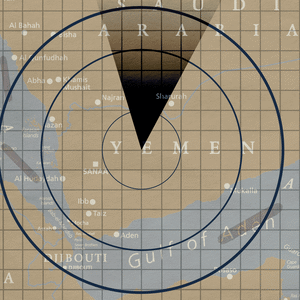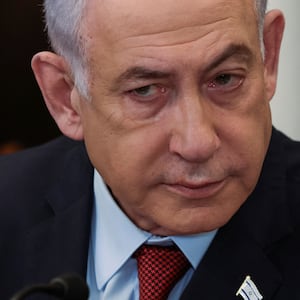The author of this article is remaining anonymous for their safety.
RAFAH, Gaza—The Instagram page of Yahia Barzaq, which was once brimming with love, life, and the pure innocence of childhood, has taken a poignant turn in recent months. What was once a collection of heartwarming images capturing the joy of newborn life has transformed into a somber memorial for young lives ended in horrific circumstances.
Barzaq, 33, is a photographer who had a thriving studio in Gaza City specializing in portraits of newborn babies. He and his wife created fantastical scenes to make the infants appear as if they were swimming with clouds, lost in dreams, avid readers, or Formula One racing drivers.
ADVERTISEMENT

Yahia Barzaq reunited in exile with one of his subjects, Maria.
Photographs courtesy of Yahia Barzaq“The same babies who once peacefully slept in dreamlike poses are now tragically absent, their lives cut short by the very conflict that uprooted us and countless others,” Barzaq told The Daily Beast.
Barzaq, his wife, and their own two children, Mohammed, 8, and Ali, 4, were forced to abandon the studio and their home in Gaza City amid the Israeli bombardment and invasion which followed the Oct. 7 Hamas attack on Israel. From exile in the south of the Gaza Strip, the photographer began to update his Instagram feed as bad news reached him from the families he captured. And so, the photographic journey, which was once a celebration of new life, became a poignant chronicle of loss and displacement. He posted haunting pictures of the deceased babies with a black line through the top left corner.
The brutality of war has rewritten the stories of the infants he once cradled through his lens, leaving him with images of the babies whose prospects were shattered by the relentless violence.
One of them was George As-Souli. He was 7 months old when he was killed with his Christian family who were seeking refuge in the oldest active church in Gaza in the early weeks of the conflict. They were hiding out at the Church of the Greek Orthodox Patriarchate School in Gaza City when a bomb blast killed 18 people including relatives of former Michigan congressman Justin Amash on Oct. 20.
Just two months earlier, Barzaq photographed the young boy. “We heard about a child I had recently photographed. He, along with his parents and entire family, had tragically lost their lives. It was a profound shock. I didn't just capture his image; I held him, comforted him, and tried to make him smile by gently touching his cheeks,” he said.

George As-Souli
Photographs courtesy of Yahia Barzaq“I was holding him for a long time in my arm so he could sleep and help us to complete the photo session. I can’t forget how innocent he was.
“Why should a child, who I had just photographed less than a month before the war, face the impact of tons of explosives erasing him from existence?”
Viola As-Souli, 61, George’s grandmother who still lives in Gaza City, told The Daily Beast: “This is the worst war ever. We lost our children, grandson, and houses, what more price should we pay?”
A devastating photo of Barzaq’s portraits of George lying tattered in the rubble of the church was captured by Al Araby and became the first tragic update on his Yahia Barzaq Studio Instagram.
Another of the babies memorialized on the page is Adam Dahdouh, who is holding a tiny knitted white heart in the shot. The 11-month-old was the grandson of Al Jazeera’s legendary Gaza bureau chief Wael al-Dahdouh. “We made a very sweet session for him…” Barzaq wrote. “He will never grow up and see how beautiful it was.”
Adam’s father, Hamza, was also killed in January.

Adam Dahdouh
Photograph courtesy of Yahia BarzaqBarzaq, who previously worked in radio engineering and as a cameraman and editor for the Qatari Al-Kass Channel, has done baby photoshoots for a couple of years but only opened his own photography studio a few months before the war began.
It’s no wonder they chose to stay in Gaza City, where they lived and worked, after a brief abortive evacuation to an over-crowded uncle’s house in Deir Al-Balah after the Oct. 7 attacks.
They stayed in their home until Nov. 11 when all hell broke loose. “We experienced a night that was among the most challenging we’ve ever faced. I cannot adequately convey the horror of the ground invasion. Tanks reached our area, unleashing a frenzy of artillery fire accompanied by airstrikes,” he said.
“Suddenly, a thick white gas filled our apartment, making it difficult to breathe, and fear prevented us from opening the windows to ventilate the space. Children began vomiting, and we struggled to catch our breath, especially since our home was already crowded with my in-laws who had sought refuge with us to stay together during these difficult times.
“The bombardment intensified even further, targeting our building with multiple shells. Additionally, the adjacent hospital building, Mehdi Hospital, was completely devastated, resulting in the loss of all lives within it. So once again to Deir Al-Balah.”
Barzaq’s wife, Nahrawan, 30, also worked at the studio—which was destroyed in the bombing—where she prepped the props for the photoshoots and made sure the children were comfortable and ready for the photo sessions.
“We have quickly made a name for ourselves,” she said. “What makes our work unique is our approach to clients. We don’t just see them as customers with a task to complete; instead, our interactions with families are genuine, forming strong connections that often evolve into lasting friendships.”
The photography sessions with parents typically last at least two hours and sometimes extend to five hours in the studio, which allows them to get to know the families.
“As displaced people now we have met numerous children whom we photographed, some in temporary shelters in schools, others in nylon tents in the streets or hospital, and a few with their relatives. Each encounter instantly takes us back to the delightful moments we shared, reminiscing about the times we captured those beautiful memories,” Nahrawan said.
Maria Barghouth was just 5 months old when the war began. Barzaq captured beautiful commemorative shots of her just two days before the start of the conflict. Due to the war erupting, the family hadn’t yet got prints of their baby girl’s photos.
Maria’s mother, a 25-year-old woman, who asked to remain anonymous, told The Daily Beast she had bumped into Yahia and Nahrawan while out shopping in Deir Al-Balah, where they are also refugees.

Baby Maria is now a refugee in southern Gaza.
Photographs courtesy of Yahia Barzaq“Maria is 9 months old now. I never thought we would capture those beautiful photos again after the studio was destroyed and Gaza was ravaged. But when we met Yahia’s family and revisited the pictures, it brought a glimmer of hope. We felt alive again,” she said.
“When the war ends, I won’t just view them on my mobile screen; I will print and place them in our home. I hope our home will be in good condition when the war is over.”







